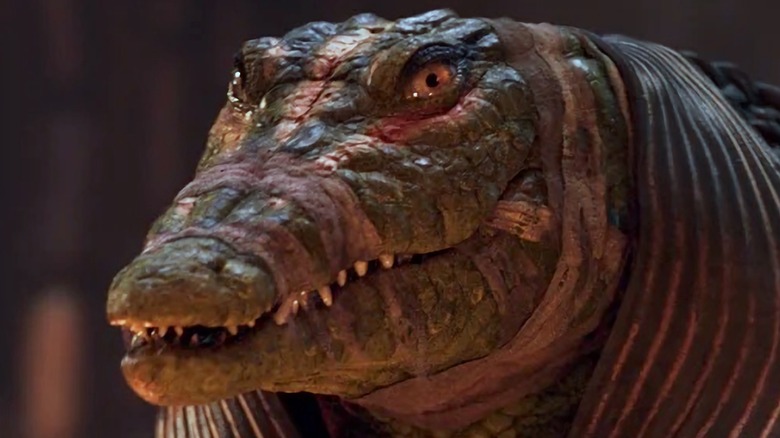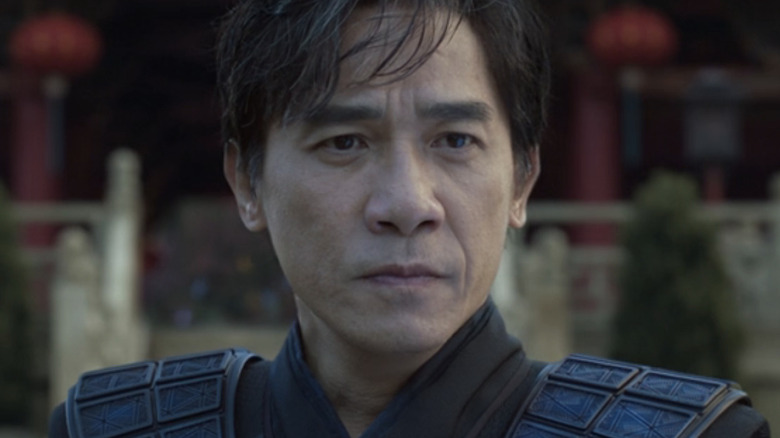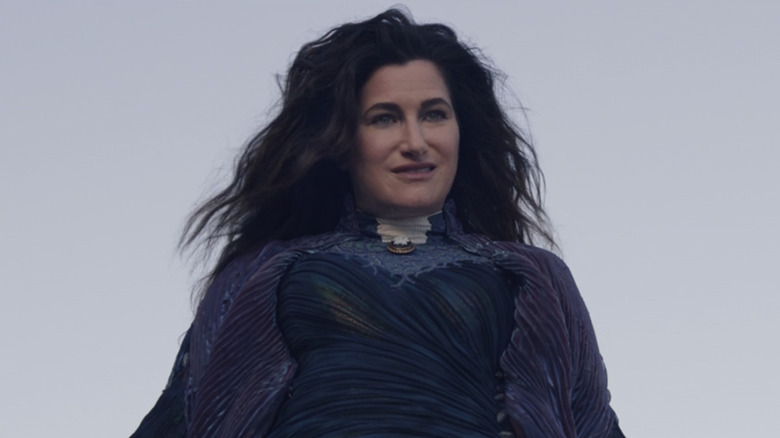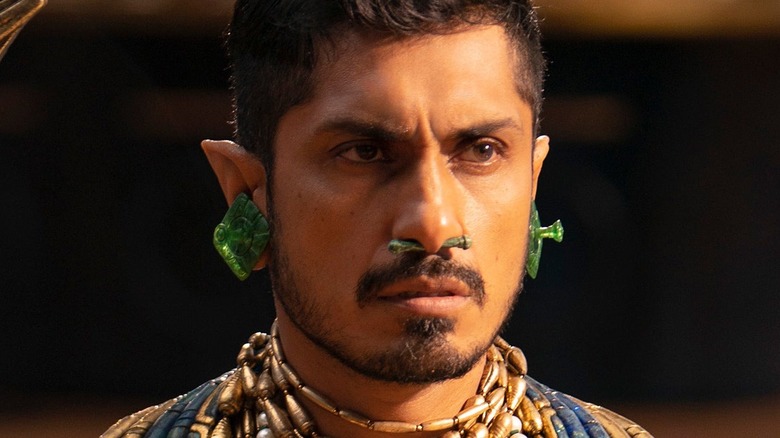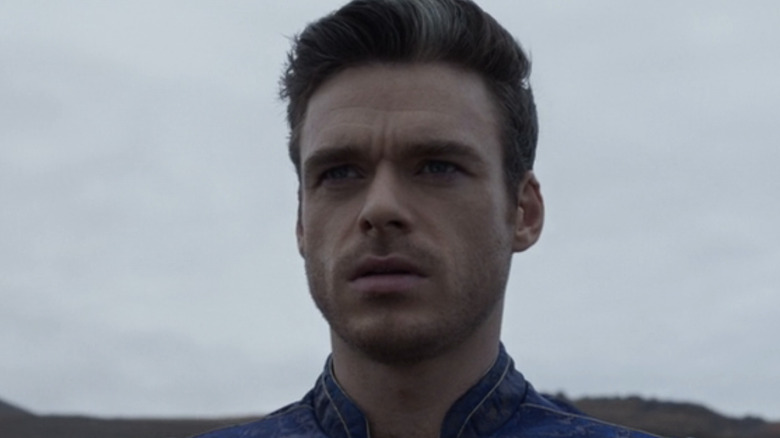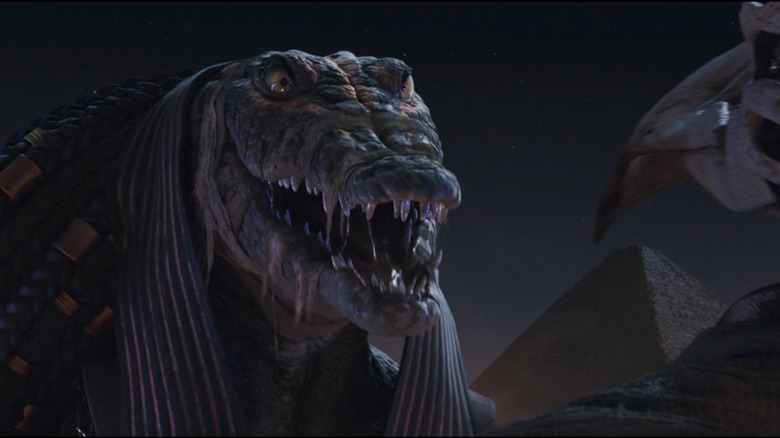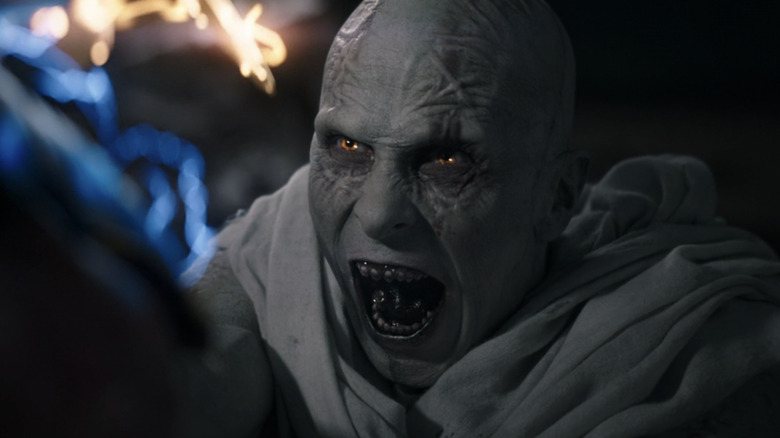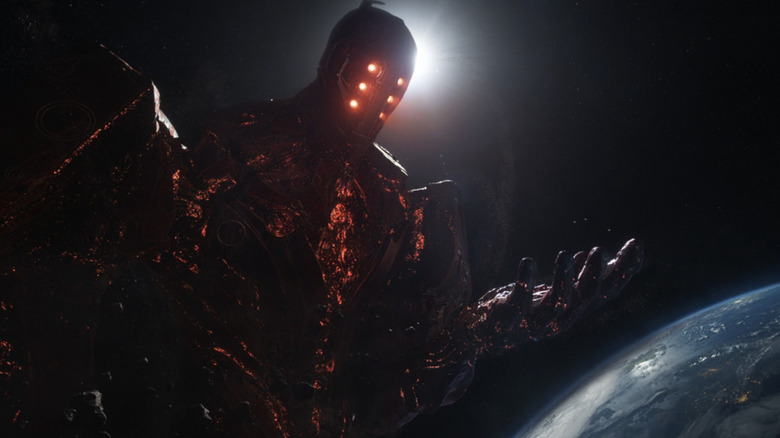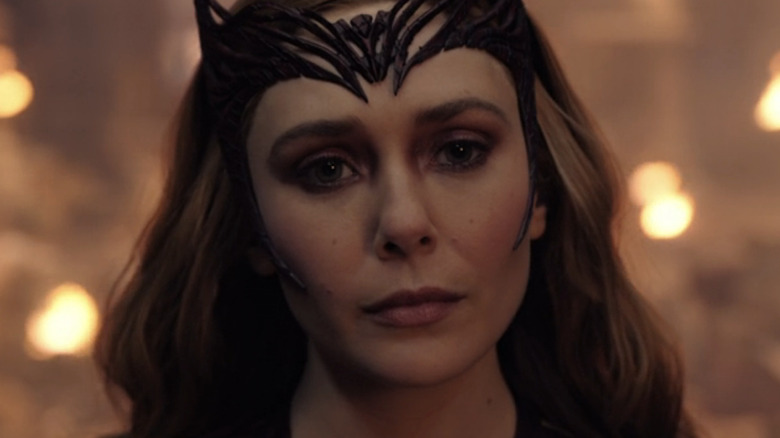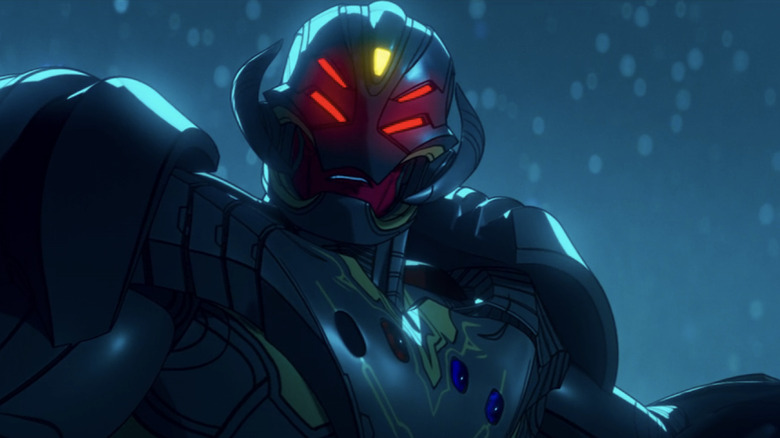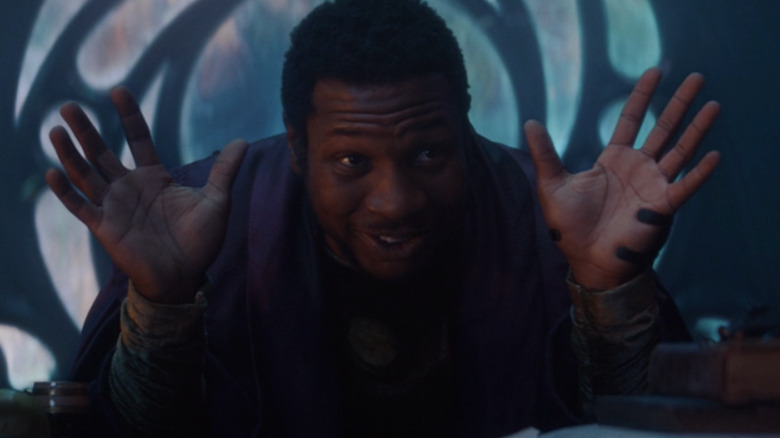The 10 Best Villains From Marvel's Phase 4, Ranked By Power
When the Marvel Cinematic Universe began with 2008's "Iron Man," the biggest, baddest villain around was an aging businessman who merely manages to poach a piece of his friend's armor. Yet these days, the MCU is teeming with villains of every conceivable variety, from thugs to zombies to lizards to gods, and that means that the threat any one of them poses might be (literally) astronomically greater or smaller than another. With Marvel's Phase 4 over, we can say with confidence that the era brought the MCU some of its most surprising villains ever — and some of its strongest. As hard as it must have been to top the Mad Titan Thanos (Josh Brolin) and his body count of trillions, Phase 4 succeeded, and even did so more than once.
After MCU Phases 1 through 3 and their villains put an entire universe at risk, some of Phase 4's big bads upped the ante by putting an infinite number of universes on the chopping block. Here, we dive into the worst of the worst, the deadliest of the deadly, and the Kangiest of Kangs (and believe us, there are many Kangs), as we present the 10 best villains from Marvel's Phase 4, ranked from least to most powerful.
10. Xu Wenwu
One of the standouts in the MCU's Phase 4 was "Shang-Chi and the Legend of the Ten Rings," which raked in almost half a billion dollars and nearly universal praise from critics and fans alike. If nothing else, the film is important for looking different than any other superhero movie — like "Black Panther," it incorporates cultural motifs, costumes, and creatures that were previously unseen in major tentpole action movies. And as we touched on once before, it had a killer villain in Xu Wenwu (Tony Leung).
While Shang-Chi (Simu Liu) is a charming lead who displays enough badass martial arts talent to keep his own feature aloft, it's his history and relationship with his father that makes the whole story work. Wenwu is the Mandarin (the real Mandarin), leader of the Ten Rings (the real Ten Rings), and as such, finally delivered on a tease that dates all the way back to 2008"s "Iron Man," the MCU's very beginning. This particular Mandarin is strong — worlds stronger than the drunken actor Trevor Slattery (Ben Kingsley), and with full possession and mastery over the Ten Rings artifacts, he's visibly stronger than most MCU characters we've met before.
Wenwu was strong enough to emerge as a warlord in feudal China, inspiring fear as he rode through Asia, conquering as he went. This makes him one of the oldest non-deity villains in the MCU, and combined with Wenwu's near-immortality and lust for power, his accumulated strength, knowledge, and willpower makes him a compelling adversary for the young Shang-Chi.
9. Agatha Harkness
By now we know that the primary source of troubles in Westview, New Jersey, wasn't really Scarlet Witch (Elizabeth Olsen). Instead, it was "Agatha All Along," a fact most of us have sung repeatedly. When "WandaVision" was first released, speculation was high as to who the villain would be and how they could possibly pose a real challenge to the reality-rewriting Scarlet Witch. We weren't disappointed when it was finally revealed that Wanda's friend Agnes was actually Agatha Harkness (Kathryn Hahn), one of the few magic users in Marvel's long history who could pose a real threat to someone like Wanda.
Though we only got a few precious episodes with her in them, we are in store for a full Harkness series, "Agatha: House of Harkness," and hopefully the full extent of her powers is explored. If Harkness' comic book counterpart is any indication, she is one of the world's greatest sorcerers, with untold lifetimes' worth of experience and practice. The comic book Harkness was actually Wanda's magic instructor, as well as one of the biggest reasons that Wanda was able to become magically pregnant with sons Billy and Tommy. Though not quite as malicious as her on-screen counterpart, the comic book Harkness proves the destructive potential and untapped power of the MCU's Harkness.
8. Namor
When it comes to powerful villains, the MCU closed out its Phase 4 with a doozie: Namor aka the Sub-Mariner (Tenoch Huerta). Ryan Coogler, the director of "Black Panther: Wakanda Forever," compared Namor to Thor and the Hulk when it comes to their potential strength, and that alone should confirm Namor as one of the MCU's most powerful villains ever. Yet his history and actions in the movie say even more than Coogler's words, no matter how bold they are.
Thanks to Namor's dialogue, we know he's the first open, confirmed mutant. (Aside from mutants teased in "Ms. Marvel," "Black Widow," and "Doctor Strange in the Multiverse of Madness.") Namor is also Talokanil, the MCU's version of Atlantean, and the combination of Talokanil and Atlantean makes him a unique — and uniquely super-powered — being on Earth. He's also the unrivaled king of one of the world's most advanced nations, in charge of much of the planet's adamantium, and one prideful, ruthless warlord. Perhaps even more importantly, the havoc that Namor wreaks in "Black Panther: Wakanda Forever" — including destroying huge chunks of its capital city and killing its queen — utterly pales in comparison to Namor and Black Panther's history of conflict in the comics. Huerta's Namor in the movie is a spot-on depiction of the comic book Namor, and that bodes well for his future in the MCU — and poorly for his enemies.
7. Ikaris
It was a tragedy for many "Game of Thrones" fans when Richard Madden's Robb Stark failed to seize the Iron Throne and become the most powerful being in Westeros. And though his character Ikaris in "Eternals" ends in a similarly tragic way to Stark, at least he can say that he got to enjoy a good 7,000 years as one of the most powerful beings on Earth. And though Ikaris spends the first half of "Eternals" as the groups shining leader, Sersi's (Gemma Chan) true love, and a righteous Boy Scout in the same vein as Superman, the midpoint revelation that his loyalty is to the Celestial harvest instead of humanity's survival firmly places him in the ranks of Marvel's villains. That level of might combined with that profound betrayal makes Ikaris easily one of Phase 4's baddest — in both senses of the word — villains.
Ikaris's powers in the film — his super strength, speed, laser vision, and the rest — suggest he's every bit as threatening as the comic book Ikaris, which means that the Eternals were lucky to beat him at all. If he didn't genuinely love Sersi, and therefore hadn't held himself back as long as he did, it's likely there wouldn't be any Eternals left for a possible sequel.
6. Ammit
One look at Ammit, the big bad in "Moon Knight," is almost certainly enough to convince any would-be doubters of her awesome power. The sight of a colossal kaiju with a human body, a crocodile head, and a clear magical aptitude would be any Marvel hero quake in their neon spandex boots. For further proof, look no further than the fact that the hero of the series, Moon Knight (Oscar Isaac), doesn't even battle Ammit. While he handles Ammit's avatar, Arthur Harrow (Ethan Hawke), Moon Knight leaves Ammit to Khonshu, another massive deity and an equally likely source for the apocalypse.
Ammit has the usual set of godlike powers, including immortality and the full set of superhuman strength, speed, senses, and the rest, but what truly makes Ammit a titanic superpower — and indeed, a compelling villain — is that she's the entire plot of the exceptionally well-reviewed "Captain America: The Winter Soldier" in one body. That movie's super-intelligent A.I. threatened to play judge, jury, and executioner with the population en masse before they had committed any crime, a premise that's familiar to Ammit, whose godly powers over life and death — along with her ability to see the past, present, and future all at once — make her a one-woman (or one-crocodile) armageddon machine.
5. Gorr the God Butcher
If there are any villains in the MCU capable of proving themselves more powerful than its gods, then the obvious first choice is Gorr the God Butcher (Christian Bale). After "Thor: Ragnarok" pitted the God of Thunder against Hela (Cate Blanchett), the god of death capable of shattering Mjolnir and singlehandedly taking out the Asgardian army, there weren't many villains that could up the ante. That's where Gorr comes in, the god (but don't call him that) whose only goal in his potentially infinite lifetime is to kill every god in the universe.
Gorr is a solid villain if only for being cruel enough and powerful enough to actually make progress in his goal of divine eradication, and he's an even better villain thanks to Bale's performance. Though reviews for "Thor: Love and Thunder" have been mixed, the fan and critic consensus regarding Bale's Gorr is positive, and it is far from surprising. Bale's an Oscar-winning actor and a multiple-time nominee, and even through a supervillain amount of makeup, CGI, and forced exposition, he can't help but deliver a memorable, nuanced performance. Making Gorr an even better villain is how sympathetic he is — instead of being an evil madman with a thirst for wealth or control, he's simply a grieving father who needs an outlet for his anger.
4. Arishem
When the Eternals entered the MCU, they raised the stakes for universal drama tenfold. Sure, the MCU's previous three phases had Thanos and eventually an Infinity Gauntlet-empowered Thanos (a whole other cosmic beast), but with the arrival of the Celestials in "Eternals," Phase 4 introduced an entire species of Thanoses. Though every Celestial is unique, they all share a few things in common, most importantly near-omnipotence and a penchant for playing God with a capital "G" with lesser species — like humanity.
Celestials had been shown as far back as 2014's "Guardians of the Galaxy," but it wasn't until "Eternals" that their role in Earth's history was revealed, as well as their desire to be a part of its future, or rather a lack thereof. According to "Eternals," the Celestial named Arishem was the first and most powerful, apparently even the creator of the first star in the universe, and his only interest in Earth is to farm its human population for eventual consumption. Despite the combined efforts of the Eternals, Arishem's plans are only momentarily halted — after their supposed victory and salvation for humankind, Arishem appears and sucks the Eternals through a black hole as if it were nothing. With "Eternals 2" a likely prospect in the MCU's future, Earth may be in store for another visit from Arishem, a visit that could end it entirely.
3. Wanda aka The Scarlet Witch
As impossible as it may sound, one of Phase 4's most powerful villains — in fact, one of the strongest in the MCU's history — is not a god, time-traveler, or Celestial, nor did they ever wield any cosmic weapon like the Ten Rings or the Infinity Gauntlet. Instead, it's a human being who was actually an Avenger: Wanda Maximoff aka the Scarlet Witch.
The reason Wanda is so powerful (apart from Hydra's experimentation on her with the Mind Stone) is that she exerts a natural control over chaos magic, an exceptionally powerful type of magic capable of creating and destroying reality itself. Unlike the more predictable, manipulable magic used by sorcerers like Doctor Strange, Wanda's magic is more primordial and therefore more capable of affecting the multiverse at its core.
Put as simply as possible, Wanda is one of Marvel's most powerful villains because she is one of the few to pose a threat to multiple universes, not just her own. For all the damage villains like Thanos and Gorr wrought on their home dimensions, the damage was contained to those dimensions. For Wanda, her home dimension is just one potential conquest among infinite others.
2. Infinity Ultron
It's hard to place anything from Phase 4's "What If?" series on a ranked list because the entire premise of the show is to imagine the weirdest, wildest, most wonderful things occurring in the vast Marvel multiverse — everything it ever shows will be the biggest, boldest, and brightest thing in its category. But the series is officially canon — and not even as crazy as the recent revelation that "GoBots" are canon — and so ranking Phase 4's best and most powerful villains without mentioning the infinity-empowered Ultron (Ross Marquand) would be wrong.
Like the Scarlet Witch, Infinity Ultron is one of the only beings in all of the MCU, be they a hero, villain, or anyone else, capable of affecting change on a multiversal scale. It was impressive enough when this version of Ultron conquered the Earth, collected all six Infinity Stones, and eventually succeeded in his mission to "bring peace" to all worlds (i.e. obliterate them). But then the Infinity Ultron somehow managed to detect the presence of the Watcher (Jeffrey Wright) and from there began a campaign of annihilation that promised to span the entire multiverse. Though he was eventually defeated, the unimaginable assemblage of beings and the amount of strength it took to bring him down proves him to be one of Marvel's all-time most powerful villains.
1. Kang the Conqueror
There is simply no denying that Kang the Conqueror is the MCU's most powerful villain and its greatest threat. There are clear categories when it comes to Marvel's villains. There are street-level thugs like Kingpin (Vincent D'Onofrio), superpowered heavy hitters like Namor, then planetary threats, divine enemies, universal menaces, and even those who imperil the entire multiverse. But there is one category that transcends them all, whose sole resident is Kang: threats to every universe and every timeline, all that ever was, is, and will be.
Though Kang only featured in Phase 4 for a few brief moments, solely in the final episode of "Loki," the unparalleled amount of power he demonstrated cannot be understated. The Kang we met, one of a great many Kang variants, acted as He Who Remains: the leader of the Time Variance Authority whose job is to control the very fabric of time itself. And again, that's just one Kang. As that version tells Loki (Tom Hiddleston) and Sylvie (Sophia Di Martino), "If you think I'm evil, well, just wait till you meet my variants."
According to that Kang, whose other statements regarding himself and the multiverse were shown to be true, he is one of the nicer, more compromising Kangs, and so chose to wield his control over reality — all realities — only for the purposes of stability and harmony. But as we can safely guess from the upcoming projects "Avengers: The Kang Dynasty" and "Avengers: Secret Wars," the MCU will soon meet some Kangs who don't play as nicely with their awesome cosmic power.
